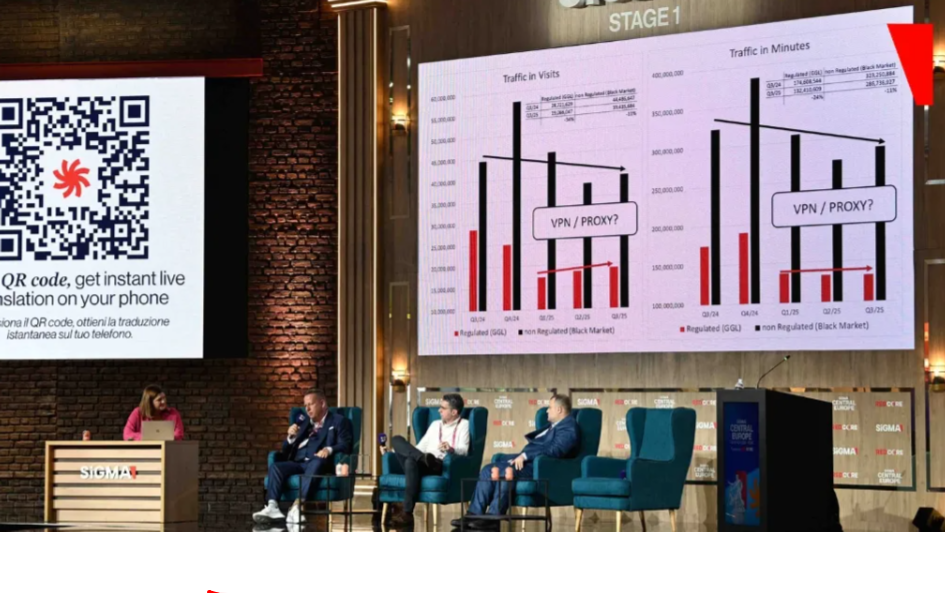
SiGMA Central Europe concluded in Rome with a clear message for regulators and operators: black market pressures are measurable, fixable, and increasingly shaped by how rules are designed and enforced, both online and on the street, at Stage 1, Regulatory Briefing, Fiera Roma, on the final day of the summit in Italy.
Jessica Maier of EGARA moderated a practical, data-led discussion with Tipico’s Christian Heins and Karsten Kasteleiner, and Casino Guru’s Matej Novota, connecting channelisation data, ad-platform enforcement, supplier conduct, and on-the-ground retail realities in Germany and beyond.
The panel framed regulatory success through channelisation, the share of players using locally licensed operators, noting 90 percent as a strong indicator, 60 to 80 percent as a middle ground, and anything under 60 percent as a sign of failing frameworks. The discussion cited Germany’s regulated online casino at roughly 6 euros GGR per capita, far below peers like the Netherlands and Denmark, signalling under-channeled demand and a persistent offshore pull. “Globally, rates of 90 or higher usually indicate effective regulation; a middle ground is roughly 60–80; anything below 60 signals poor or failing regulation,” said the moderator, setting the benchmark for the session.
Heins described a three-part black market supply stack built on games content, payments, and advertising, arguing that coordinated constraints on these inputs would limit offshore resilience and reduce leakage. “If reputable suppliers stopped distributing to unlicensed operators, if payment firms refused high-risk processing, and if major ad platforms and affiliates blocked black-market campaigns, the model would struggle,” he said, calling for industry-led solutions that align incentives with compliance. Heins pointed to Tipico’s Trusted Partner programme and an internal code of conduct for studios that shifted inventory to regulated channels; after seven months, about 85 percent of revenue came from regulated-only providers, with double-digit growth achieved despite product constraints.
The panel noted that systematic monitoring, escalation to platforms, and regulator support drove illicit ad removals in search from tens of thousands to under 1,000 per month, demonstrating how targeted enforcement can bend the curve quickly. By contrast, publicly accessible Ad Library queries revealed far higher volumes on social, with one September snapshot showing around 77,000 distinct campaigns linked to offshore acquisition, implying significant tax losses even under conservative assumptions. “This highlights the urgency of ad-platform enforcement parity alongside search,” said Heins, urging consistent standards across primary channels to prevent displacement rather than resolution.
“Unlike online, the land-based black market leaves fewer digital traces; you must walk the streets and count venues and terminals,” stated Kasteleiner.
Novota reported that complaint data spiked from Germany after the regulation came into force, with players filing around ten times more grievances against unregulated casinos than licensed operators, and directing most cases to offshore authorities instead of the national regulator. “In markets like the UK, a far larger share, roughly 20 percent, of complaints go to regulated operators; in Germany, it is closer to 1 percent,” he said, highlighting a behavioural shift that mirrors lower channelisation. The pattern aligns with observed use of VPNs to access offshore products and suggests that rules creating excessive friction, without commensurate enforcement, can accelerate leakage.
Counting terminals, not clicks
Kasteleiner outlined visible street-level activity where illegal betting terminals operate in shisha bars, kiosks, billiard halls, and fuel stations, despite rules limiting legal sales to licensed shops, with non-whitelisted branding often in plain sight. “Unlike online, the land-based black market leaves fewer digital traces; you must walk the streets and count venues and terminals,” he said, noting that multi-agency checks frequently lack specialist gambling knowledge, which targeted training is beginning to address. A new raid-tracker initiative is intended to document enforcement actions and quantify scale over time, closing data gaps that currently hinder prioritisation and deterrence.
Calibrate player‑protection to reduce unnecessary friction and lift channelisation without pushing users offshore.
Revisit product restrictions that depress entertainment value and RTP beyond what players accept.
As SiGMA Central Europe concludes in Rome, the roadshow continues with SiGMA South Asia in Colombo, Sri Lanka, from 30 November to 02 December, where regulation, market integrity, and sustainable growth remain at the forefront.
#SiGMACentralEurope #iGaming #Regulation #Compliance #ResponsibleGaming #Channelisation #MarketIntegrity #GamingIndustry